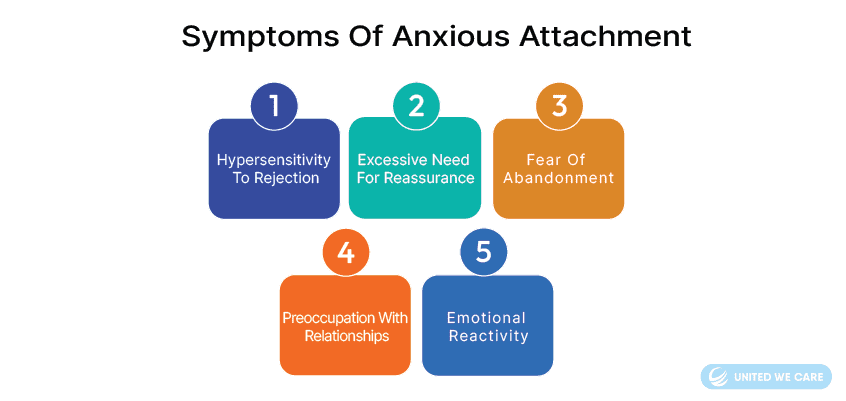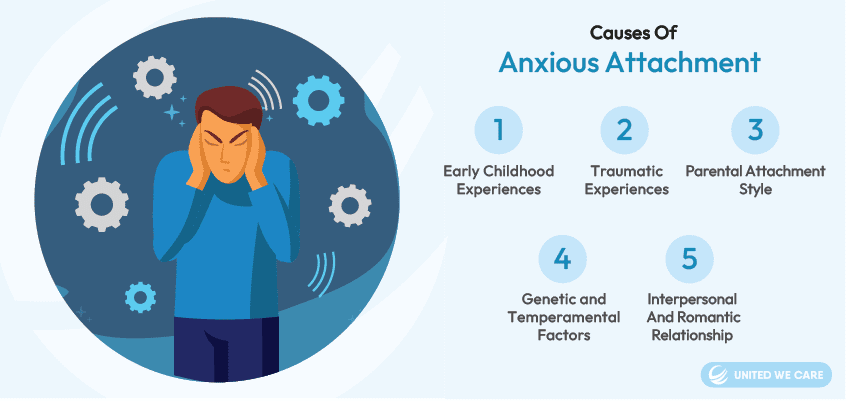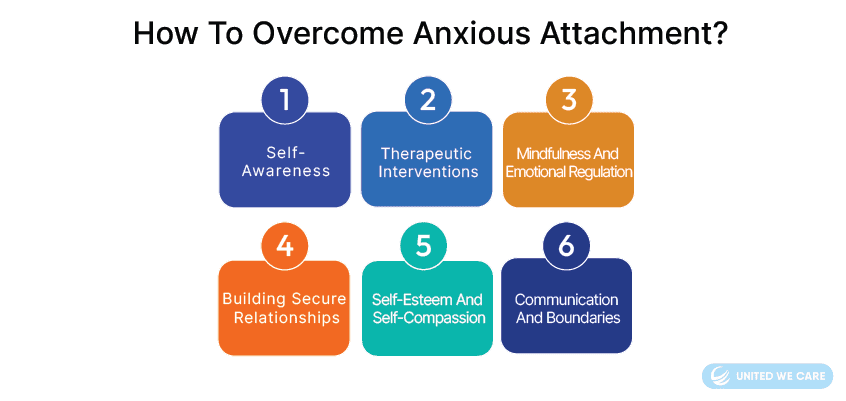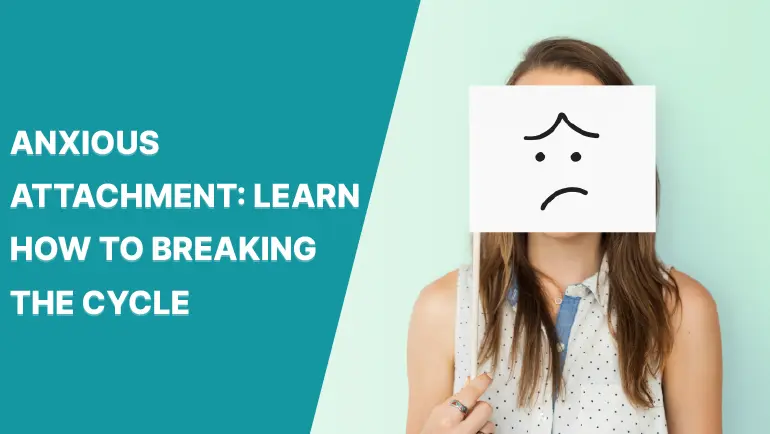Introduction
If you have ever felt a strong desire to always be close to those you love or get scared of being alone in life, you probably have an Anxious Attachment. Individuals with anxious attachment often exhibit clingy or dependent behaviors, experience excessive worry, and struggle with trust and self-esteem. Understanding these patterns can improve your relationship with yourself and promote good physical, mental, and behavioral well-being.
“Love without attachment is light.” – Norman O. Brown [1]
What Is Anxious Attachment?
Attachment is the feeling of liking someone very much. We are all attached to someone, be it our parents, siblings, friends, family, or colleagues. However, there are different ways of showing this attachment. This difference emerges from our childhood experiences.
Bowlby and Ainsworth were two psychologists who developed the Attachment Theory. One of the attachment styles that they spoke of was Anxious Attachment.
As per the anxious attachment style, people constantly seek reassurance, monitor the availability of their partner, and react strongly when there’s a possible threat to the relationship. Therefore, such people have a heightened desire for intimacy and an intense fear of abandonment [2].
Parents who were sometimes caring and other times neglectful contribute to the children having an increased awareness of when they are getting left behind or rejected [3].
Grown-ups with an anxious attachment style tend to doubt themselves, are not content in their relationships, and often experience conflict. They may throw tantrums or get upset unnecessarily just to get attention from their partners. Unfortunately, their fears and neediness may make their partners keep their distance, resulting in a never-ending cycle of insecurity and an unsteady relationship [4].
More Information about Dealing with Mommy Issues in Relationship
Symptoms Of Anxious Attachment
Anxious attachment can significantly impact individuals’ thoughts, emotions, and relationship behaviors. Some common symptoms of anxious attachment are [5]:

- Hypersensitivity to Rejection: If you have an anxious attachment style, you will feel that everyone around you will reject you or leave you eventually. So you might become over-aware of any signs that could be possible indications for the same.
- Excessive Need for Reassurance: Seeking reassurance and validation is a classic trait for anxious attachment. If you need assurance and validation at the smallest things from your partner, like what you should wear and what you should eat, you might have an anxious attachment style. Not getting a proper verbal or physical response from your partner can make you anxious and distressed.
- Fear of Abandonment: Let’s say your partner has to go on a one-day trip. If the very thought of it brings out a feeling of anxiety and causes breathlessness, then it’s highly likely you have an anxious attachment style. You might worry excessively about your relationships’ stability and longevity, elevating your fear of abandonment or being left alone.
- Preoccupation with Relationships: With these new location apps freely available in the market, tracking everyone has become so easy. So if you constantly want to know where your partner is, when they are available, and analyze their each word for signs of rejection or disinterest, then you have an anxious attachment style.
- Emotional Reactivity: As someone with an anxious attachment style, you might react more intensely to relationship issues, like if your partner talks to someone else in a sweet tone or helps a stranger out. You may feel heightened anxiety, jealousy, and mood swings when such a situation occurs.
Causes Of Anxious Attachment
Anxious attachment develops in childhood, and various factors can contribute to it [6]:

- Early Childhood Experiences: Some parents do not care for their children on a daily basis or react in a way that nobody expected. These reactions of uncaring behavior and neglect can contribute to anxious attachment. This way, the child might feel uncertain and insecure.
- Traumatic Experiences: Traumatic events, such as parental loss, abuse, or neglect, can shake the foundation of secure and loving relationships for children. Such events can add to the fear of abandonment and the need for validation.
- Parental Attachment Style: We all learn some traits or the other from our parents. Anxious attachment can be one such trait. If your parents or caregivers showed signs of an anxious attachment style, then it’s highly likely that you will too.
- Genetic and Temperamental Factors: Not only do we learn traits from our parents, we get their genes as well. Anxiety and stress have the power to alter our very DNA. So if you take on too much stress or have anxiety, you might develop anxious attachment.
- Interpersonal and Romantic Relationship Experiences: If you have faced negative experiences in your past relationships, such as betrayal or repeated rejections, you can develop an anxious attachment style. For any relationship that gets built, you might need reassurance at every step and show nervous behaviors.
More Information about Mommy Issues Vs. Daddy Issues
Effects Of Anxious Attachment
Anxiety by itself can harm emotional health and relationships. Now add insecurity and feelings of abandonment, and that’s a cocktail of multiple issues [7]:
- Relationship Dissatisfaction: As someone with an anxious attachment style, you might find it difficult to trust your partner, which can lead to many fights, conflicts, and dissatisfaction.
- Emotional Distress: Anxious attachment can lead to higher levels of emotional distress. You may go through increased anxiety, worry, and jealousy levels in your relationships. Your partner may have to deal with your constant mood swings, and you might find it difficult to regulate your emotions well.
- Low Self-Esteem: Talking and thinking negatively about yourself lowers your self-worth. Doing so can hamper your desirability in your mind, and such a feeling can make you insecure about yourself and your relationship with your partner.
- Dependency and Clinginess: If you are heavily dependent on your partner for small tasks like going to the supermarket to get groceries or choosing your clothes for the day, you may be looking for validation and reassurance from your partner. Doing so may make you come out as clingy.
- Relationship Instability: Your fears and insecurities can make your relationship with your partner quite unstable. Feeling insecure can cause friction and even breakups.
Must read Attachment Styles
How To Overcome Anxious Attachment?
I know correcting issues that are deep-rooted in your childhood may not be easy to overcome. However, it is possible [8]:

- Self-Awareness: Become aware of your actions and reactions. See what brings out your fears and insecurities and makes you nervous about your relationship.
- Therapeutic Interventions: Attachment-focused therapy is one of the best ways to overcome an anxious attachment style. Your therapist can provide you with a safe space for you to be vocal about your issues. They can help you build healthier coping mechanisms so that you can have a secure attachment style in the future. United We Care is one such platform that can help you.
- Mindfulness and Emotional Regulation: Be aware of your emotions throughout the day. For this, you can use mindfulness techniques that can reduce anxiety and impulsive reactions with your partner.
- Building Secure Relationships: Understand that just because you have your doubts, you will find people and partners that will just validate your point. Allow yourself to trust people and accept their support, and you will be able to build secure relationships that will stand with you even when you have mood swings.
- Self-Esteem and Self-Compassion: We are all work-in-progress. Give yourself the time and space to work on your issues. Through self-esteem and self-compassion-building exercises, you can become more aware of yourself.
- Communication and Boundaries: Talk to people; I cannot emphasize this more. Talk to your loved ones and set clear boundaries about what works and does not work for you in terms of security and anxiety.
More Information about Healthy Relationship
Conclusion
Our childhood paves a path for our future. So, having an attachment anxious style is not your fault. It just impacts your emotions and relationships. However, it is possible to overcome feelings of abandonment, insecurity, dissatisfaction, low self-esteem, and trust issues. But, by becoming more aware of yourself and talking to people you trust, you can overcome these challenges.
If you are facing anxious attachment symptoms, you can connect with our expert counselors or explore more content at United We Care! At United We Care, a team of wellness and mental health experts will guide you with the best methods for your well-being.
References
[1]“Norman O. Brown Quote: ‘Love without attachment is light.,’” Norman O. Brown Quote: “Love without attachment is light.” https://quotefancy.com/quote/1563397/Norman-O-Brown-Love-without-attachment-is-light
[2] Mikulincer, M. and P. R. Shaver. , Attachment in adulthood: Structure, dynamics, and change . New York, USA: Guilford Press, 2007. [Online]. Available: https://books.rediff.com/book/ISBN:1606236105
[3] C. Hazan and P. Shaver, “Romantic love conceptualized as an attachment process.,” Journal of Personality and Social Psychology, vol. 52, no. 3, pp. 511–524, 1987, doi: 10.1037/0022-3514.52.3.511.
[4] B. C. Feeney and J. Cassidy, “Reconstructive Memory Related to Adolescent-Parent Conflict Interactions: The Influence of Attachment-Related Representations on Immediate Perceptions and Changes in Perceptions Over Time.,” Journal of Personality and Social Psychology, vol. 85, no. 5, pp. 945–955, 2003, doi: 10.1037/0022-3514.85.5.945.
[5] J. A. Simpson and W. S. Rholes, “Attachment and relationships: Milestones and future directions,” Journal of Social and Personal Relationships, vol. 27, no. 2, pp. 173–180, Mar. 2010, doi: 10.1177/0265407509360909.
[6] E. Waters, S. Merrick, D. Treboux, J. Crowell, and L. Albersheim, “Attachment Security in Infancy and Early Adulthood: A Twenty‐Year Longitudinal Study,” Child Development, vol. 71, no. 3, pp. 684–689, May 2000, doi: 10.1111/1467-8624.00176.
[7] L. E. Evraire, J. A. Ludmer, and D. J. A. Dozois, “The Influence of Priming Attachment Styles on Excessive Reassurance Seeking and Negative Feedback Seeking in Depression,” Journal of Social and Clinical Psychology, vol. 33, no. 4, pp. 295–318, Apr. 2014, doi: 10.1521/jscp.2014.33.4.295.
[8] K. B. Carnelley, P. R. Pietromonaco, and K. Jaffe, “Depression, working models of others, and relationship functioning.,” Journal of Personality and Social Psychology, vol. 66, no. 1, pp. 127–140, 1994, doi: 10.1037/0022-3514.66.1.127.









